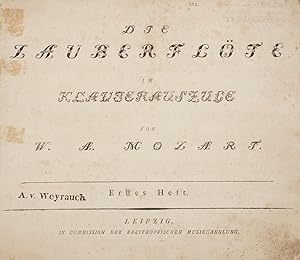Beschreibung
2 volumes bound in one. Oblong quarto. Contemporary mid-tan leather-backed paper-covered boards with red leather title label within decorative border gilt to upper. Music typeset. Text in German. Complete as issued in 37 separately-paginated parts numbered 1-34 plus one misnumbered ("29" used twice) plus the overture and a march, both unnumbered, bound non-sequentially, as follows: ERSTES HEFT 1f. (title) Ouverture, Aus der Zauberflöte des Herrn Mozart. 8 pp. No. 2: Aria. Der Vogelfänger bin ich ja. 2 pp. No. 3: Aria: Dies Bildniss ist bezaubernd schön. 4 pp. No. 4: Recitativ. O zittre nicht. 5 pp. No. 6: Terzett. Du seines Täubchen nur herein. 6 pp. No. 7: Duett. Bey Männern welche. 4 pp. No. 8: Terzett. Zum Ziele führt dich diese Bahn. 4 pp. No. 10: Aria. Wie stark ist nicht dein Zauberton. 4 pp. No. 11: Glockenspiel. Das klinget so herrlich. Duett. 3 pp. Marsch während dem Zug im Weisheitstempel. 2 pp. No. 15: Aria. O Isis und Osiris. 2 pp. No. 16: Duett. Bewahret euch für Weibertücken. 2 pp. No. 18: Aria. Alles fühlt der Liebe Freuden. 3 pp. No. 19: Aria. Der Hölle Rache kocht in meinem Herzen. 4 pp. No. 20: Aria. In diesen heiligen Hallen. 4 pp. No. 21: Terzett. Seyd uns zum zweytenmal willkommen. 4 pp. No. 22: Aria. Ach ich fühls. 2 pp. No. 23: Chor der Priester. O Isis und Osiris welche Wonne! 3 pp. No. 24: Terzett. Soll ich dich Theurer nicht mehr sehn. 6 pp. No. 25: Aria. Ein Mädchen, oder Weibchen. 2 pp. No. 28: Duett. Tamino mein! O welch ein Glück! 4 pp. No. 29: Marsch. Wir wandelten durch Feuergluthen. 3 pp. No. 30: Aria. Papagena! Weibchen! Täubchen! 6 pp. No. 32. Aria. Ich Narr vergass der Zauberdinge. 2 pp. No. 33. Duett. Pa, Pa, Papagena. 6 pp. ZWEYTES HEFT 1f. (title) No. 1: Introductio. Zu Hülfe! zu Hülfe! sonst bin ich verlohren! 12 pp. No. 5: Quintetto Hm, hm, hm, hm! 16 pp. No. 9: Recitativ. Dis Weisheitslehre dieser Knaben. 8 pp. No. 12: Terzett. Schnelle Füsse, rascher Muth. 4 pp. No. 13: Chor. Es lebe Sarastro. 6 pp. No. 14: Finale. Nun stolzer Jüngling, nur herbey! 8 pp. No. 17: Quintett. Wie? wie? wie? ihr an. 10 pp. No. 26: Finale. Bald prangt, den Morgen. 11 pp. No. 27: Duett. Der welcher wandelt. 6 pp. No. 29[!]: Chor. Triumph! Triumph! 3 pp. No. 31. Quartett. Halt ein! halt ein! o Papageno. 2 pp. No. 34. Schlusschor. Nur stille! stille! stille! 12 pp. With small ink handstamp of A.V. Weyrauch to lower portion of title to Book I and "inherited" in Hebrew to upper margin of title. Disbound; boards considerably worn and defective. Light uniform browning; some wear and soiling; occasional foxing and small stains; first signature detached. As in most copies, lacking the full-page engraving by Johann August Rosmässler from Act II scene 17 depicting Monostatos and Pamina in the garden at night following title to Vol. I; half-title also lacking. General title misbound following title to Zweytes Heft. One of the earliest editions. Köchel, p. 712. Hirsch IV, 187. Hoboken 12, 559. RISM M4785 (3 complete copies in the U.S.). August Heinrich von Weyrach (1788-1865), born in Riga and died in Dresden, was a linguist and composer. In 1824 he published, under his own name, a song entitled "Nach Osten," with German text by Wetzel. In ca. 1840 an anonymous Parisian publisher reprinted it, with Schubert s name on the title page, as "Adieu," with French text by Belanger; a piano transcription of it, also crediting the authorship to Schubert, was published by Döhler in Germany in 1843; Schlesinger of Berlin reprinted the song, with a German translation of the French text, as Schubert s in 1845; since then it has been reprinted many times as Schubert s by European and American publishers. Another reference to Weyrauch appears in the works list of Franz Liszt in Grove Music Online (an arrangement of the first song, Lebewohl, LW 109, of Schubert's Sechs Melodien, composed by Weyrauch with German text by Wetzel). Bestandsnummer des Verkäufers 31193
Verkäufer kontaktieren
Diesen Artikel melden
![]()

